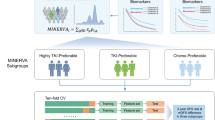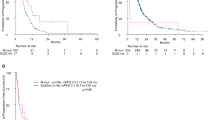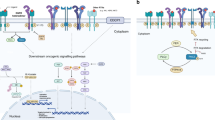Abstract
Epidermal growth factor receptor (EGFR) and HER2 are cell surface receptor tyrosine kinases (TKs) that transduce growth signals through dimerization with HER family receptors. The heterodimerization of EGFR with HER2 induces a more potent activation of EGFR TK than does EGFR homodimerization. When tumor cells overexpress both EGFR and HER2, they exhibit aggressive tumor cell growth, owing to the increased potential for EGFR/HER2 heterodimerization and signaling. Gefitinib and erlotinib are EGFR TK inhibitors (EGFR TKIs) and have antitumor activity in 8–18% of patients with advanced non-small-cell lung cancer (NSCLC). Certain patient subsets are particularly responsive to EGFR TKIs. Analyses of biomarkers from patients in clinical studies of EGFR TKIs show correlations between objective tumor response and EGFR overexpression, as detected by immunohistochemistry and increased gene copy number measured by fluorescence in situ hybridization analysis. Furthermore, NSCLC tumors that overexpress both EGFR and HER2 are more sensitive to EGFR TKIs than are tumors that overexpress EGFR but are HER2 negative. Therefore, the measurement of EGFR and HER2 protein expression and the gene copy number in NSCLC tumors may have a prognostic value in NSCLC and a predictive value for identifying patients likely to benefit from an EGFR TKI. These considerations suggest that the simultaneous inhibition of EGFR and HER2 may warrant further study in patients with NSCLC.
This is a preview of subscription content, access via your institution
Access options
Subscribe to this journal
Receive 50 print issues and online access
$259.00 per year
only $5.18 per issue
Buy this article
- Purchase on Springer Link
- Instant access to full article PDF
Prices may be subject to local taxes which are calculated during checkout

Similar content being viewed by others
References
Brabender J, Danenberg KD, Metzger R, Schneider PM, Park J, Salonga D et al. (2001). Epidermal growth factor receptor and HER2-neu mRNA expression in non-small cell lung cancer is correlated with survival. Clin Cancer Res 7: 1850–1855.
Cappuzzo F, Hirsch FR, Rossi E, Bartolini S, Ceresoli GL, Bemis L et al. (2005a). Epidermal growth factor receptor gene and protein and gefitinib sensitivity in non-small-cell lung cancer. J Natl Cancer Inst 97: 643–655.
Cappuzzo F, Ligorio C, Jänne PA, Toschi L, Rossi E, Trisolini R et al. (2007). Prospective study of gefitinib in epidermal growth factor receptor fluorescence in situ hybridization-positive/phospho-Akt-positive or never smoker patients with advanced non-small-cell lung cancer: the ONCOBELL trial. J Clin Oncol 25: 2248–2255.
Cappuzzo F, Varella-Garcia M, Shigematsu H, Domenichini I, Bartolini S, Ceresoli GL et al. (2005b). Increased HER2 gene copy number is associated with response to gefitinib therapy in epidermal growth factor receptor-positive non-small-cell lung cancer patients. J Clin Oncol 23: 5007–5018.
Daniele L, Macri L, Schena M, Dongiovanni D, Bonello L, Armando E et al. (2007). Predicting gefitinib responsiveness in lung cancer by fluorescence in situ hybridization/chromogenic in situ hybridization analysis of EGFR and HER2 in biopsy and cytology specimens. Mol Cancer Ther 6: 1223–1229.
Grandis JR, Sok JC . (2004). Signaling through the epidermal growth factor receptor during the development of malignancy. Pharmacol Ther 102: 37–46.
Herbst RS, Chansky K, Kelly K, Atkins JA, Davies AM, Dakhil SR et al. (2007). A phase II randomized selection trial evaluating concurrent chemotherapy plus cetuximab or chemotherapy followed by cetuximab in patients with advanced non-small cell lung cancer (NSCLC): final report of SWOG 0342 (abstract no. 7545). Presented at the 43rd Annual Meeting of the American Society of Clinical Oncology, Chicago, IL, 1–5 June 2007.
Hirsch FR, Franklin WA, Veve R, Varella-Garcia M, Bunn Jr PA . (2002). HER2/neu expression in malignant lung tumors. Semin Oncol 29: 51–58.
Hirsch FR, Herbst RS, Olsen C, Chansky K, Crowley J, Kelly K et al. (2008). Increased EGFR gene copy number detected by fluorescent in situ hybridization predicts outcome in non-small-cell lung cancer patients treated with cetuximab and chemotherapy. J Clin Oncol 26: 3351–3357.
Hirsch FR, Varella-Garcia M, Bunn Jr PA, Franklin WA, Dziadziuszko R, Thatcher N et al. (2006). Molecular predictors of outcome with gefitinib in a phase III placebo-controlled study in advanced non-small-cell lung cancer. J Clin Oncol 24: 5034–5042.
Hirsch FR, Varella-Garcia M, Cappuzzo F, McCoy J, Bemis L, Xavier AC et al. (2007). Combination of EGFR gene copy number and protein expression predicts outcome for advanced non-small-cell lung cancer patients treated with gefitinib. Ann Oncol 18: 752–760.
Hirsch FR, Varella-Garcia M, McCoy J, West H, Xavier AC, Gumerlock P et al. (2005). Increased epidermal growth factor receptor gene copy number detected by fluorescence in situ hybridization associates with increased sensitivity to gefitinib in patients with bronchioloalveolar carcinoma subtypes: a Southwest Oncology Group Study. J Clin Oncol 23: 6838–6845.
Lynch TJ, Bell DW, Sordella R, Gurubhagavatula S, Okimoto RA, Brannigan BW et al. (2004). Activating mutations in the epidermal growth factor receptor underlying responsiveness of non-small-cell lung cancer to gefitinib. N Engl J Med 350: 2129–2139.
Meert AP, Martin B, Delmotte P, Berghmans T, Lafitte JJ, Mascaux C et al. (2002). The role of EGF-R expression on patient survival in lung cancer: a systematic review with meta-analysis. Eur Respir J 20: 975–981.
Merrick D, Kittelson J, Wintherhalder R, Kotantoulos G, Ingeberg S, Keith RL et al. (2006). Analysis of c-ErbB1/epidermal growth factor receptor and c-ErbB2/HER-2 expression in bronchial dysplasia: evaluation of potential targets for chemoprevention of lung cancer. Clin Cancer Res 12 (7 Pt 1): 2281–2288.
Onn A, Correa AM, Gilcrease M, Isobe T, Massarelli E, Bucana CD et al. (2004). Synchronous overexpression of epidermal growth factor receptor and HER2-neu protein is a predictor of poor outcome in patients with stage I non-small cell lung cancer. Clin Cancer Res 10: 136–143.
Paez JG, Jänne PA, Lee JC, Tracy S, Greulich H, Gabriel S et al. (2004). EGFR mutations in lung cancer: correlation with clinical response to gefitinib therapy. Science 304: 1497–1500.
Pao W, Miller V, Zakowski M, Doherty J, Politi K, Sarkaria I et al. (2004). EGF receptor gene mutations are common in lung cancers from ‘never smokers’ and are associated with sensitivity of tumors to gefitinib and erlotinib. Proc Natl Acad Sci USA 101: 13306–13311.
Pirker R, Szczesna A, von Pawel J, Krzakowski M, Ramlau R, Park K et al. (2008). FLEX: A randomized, multicenter, phase III study of cetuximab in combination with cisplatin/vinorelbine (CV) versus CV alone in the first-line treatment of patients with advanced non-small cell lung cancer. J Clin Oncol 26 (Suppl 18): 1006s.
Rubin Grandis J, Melhem MF, Barnes EL, Tweardy DJ . (1996a). Quantitative immunohistochemical analysis of transforming growth factor-alpha and epidermal growth factor receptor in patients with squamous cell carcinoma of the head and neck. Cancer 78: 1284–1292.
Rubin Grandis J, Zeng Q, Tweardy DJ . (1996b). Retinoic acid normalizes the increased gene transcription rate of TGF-alpha and EGFR in head and neck cancer cell lines. Nat Med 2: 237–240.
Salomon DS, Brandt R, Ciardiello F, Normanno N . (1995). Epidermal growth factor-related peptides and their receptors in human malignancies. Crit Rev Oncol Hematol 19: 183–232.
Sequist LV, Bell DW, Lynch TJ, Haber DA . (2007). Molecular predictors of response to epidermal growth factor receptor antagonists in non-small-cell lung cancer. J Clin Oncol 25: 587–595.
Soh J, Toyooka S, Ichihara S, Fujiwara Y, Hotta K, Suehisa H et al. (2007). Impact of HER2 and EGFR gene status on gefitinib-treated patients with non-small-cell lung cancer. Int J Cancer 121: 1162–1167.
Tokumo M, Toyooka S, Kiura K, Shigematsu H, Tomii K, Aoe M et al. (2005). The relationship between epidermal growth factor receptor mutations and clinicopathologic features in non-small cell lung cancers. Clin Cancer Res 11: 1167–1173.
Tsai CM, Chang KT, Wu LH, Chen JY, Gazdar AF, Mitsudomi T et al. (1996). Correlation between intrinsic chemoresistence and HER-2/neu gene expression, p53 mutations and cell proliferation characteristics in non-small cell lung cancer cell lines. Cancer Res 56: 206–209.
Tsao MS, Sakurada A, Cutz JC, Zhu CQ, Kamel-Reid S, Squire J et al. (2005). Erlotinib in lung cancer—molecular and clinical predictors of outcome. N Engl J Med 353: 133–144.
Wong AJ, Ruppert JM, Bigner SH, Grzeschik CH, Humphrey PA, Bigner DS et al. (1992). Structural alterations of the epidermal growth factor receptor gene in human gliomas. Proc Natl Acad Sci USA 89: 2965–2969.
Zhu C-Q, da Cunha Santos G, Ding K, Sakurada A, Cutz JC, Liu N et al. (2008). Role of KRAS and EGFR as biomarkers for response to erlotinib in National Cancer Institute of Canada Clinical Trials Group study BR-21. J Clin Oncol 26: 4268–4275.
Acknowledgements
The authors thank Johnathan C Maher, PhD, of BlueSpark Heathcare Communications for medical and editorial assistance in this paper. Financial support for medical and editorial assistance was provided by Boehringer Ingelheim Pharmaceuticals.
Author information
Authors and Affiliations
Corresponding author
Rights and permissions
About this article
Cite this article
Hirsch, F., Varella-Garcia, M. & Cappuzzo, F. Predictive value of EGFR and HER2 overexpression in advanced non-small-cell lung cancer. Oncogene 28 (Suppl 1), S32–S37 (2009). https://doi.org/10.1038/onc.2009.199
Published:
Issue Date:
DOI: https://doi.org/10.1038/onc.2009.199
Keywords
This article is cited by
-
Molecular basis of VEGFR1 autoinhibition at the plasma membrane
Nature Communications (2024)
-
Chemo-preventive effects and antitumorigenic mechanisms of beer and nonalcoholic beer toward 4-(methylnitrosamino)-1-(3-pyridyl)-1-butanone (NNK) - induced lung tumorigenesis in A/J mice
Genes and Environment (2023)
-
Phenotypic and molecular characterization of novel pulmonary adenocarcinoma cell lines established from a dog
Scientific Reports (2023)
-
Human epidermal growth factor receptor 2 (HER2)-specific chimeric antigen receptor (CAR) for tumor immunotherapy; recent progress
Stem Cell Research & Therapy (2022)
-
Design, synthesis, biological evaluation and in silico studies of EGFR inhibitors based on 4-oxo-chromane scaffold targeting resistance in non-small cell lung cancer (NSCLC)
Medicinal Chemistry Research (2022)



